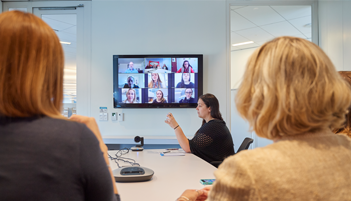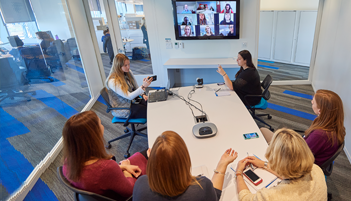HOW CAN WE HELP YOU? Call 1-800-TRY-CHOP
In This Section
Expanding Access to Diagnosis With ECHO Autism
Editor’s Note: Where Discovery Leads is a multimedia storytelling project that delves into key research themes at CHOP Research Institute. This is part three of a three-part series that focuses on novel diagnostic tools and approaches being developed under the leadership of the Center for Autism Research at CHOP. See part 1 and part 2 of this series.
Not all families live close to an autism specialist, so primary care providers need information and support to help families in their local practices. A free clinical service offered by the Division of Behavioral Pediatrics and the Center for Autism Research at Children’s Hospital of Philadelphia connects primary care providers with autism specialists through telemedicine, to increase capacity for screening, diagnosis and management in the community.
ECHO Autism at CHOP began as a research study funded through the Autism Speaks Autism Treatment Network. Based on Project ECHO (Extension of Community Health Outcomes), a telemedicine model that has now been developed for dozens of specialized health conditions, ECHO Autism aims to train primary care providers in underserved areas to utilize proven assessment tools and accurately diagnose patients who clearly meet the criteria for ASD. As one of 12 Autism Treatment Network sites in North America, CHOP and CAR are uniquely positioned to share standards of care, resources, and expertise in this way.
“ECHO Autism is one of the most cost-effective interventions I’ve seen,” said Amanda Bennett, MD, MPH, a developmental pediatrician at CHOP and CAR. “The technology already exists, and it requires a small amount of the hub team’s time. With opportunities to build capacity, this model could improve access to services for everyone.”
 Although the research study ended in 2017, ECHO Autism at CHOP is now available to primary care providers, licensed clinical social workers, early intervention specialists, psychologists, and psychiatrists. The only prerequisites for participation are internet access, a device with a forward-facing camera, and a one-time signup in order to receive an invitation link for the meeting. Participants have been as far-flung as Tanzania, as close as West Philadelphia, and from many points in between.
Although the research study ended in 2017, ECHO Autism at CHOP is now available to primary care providers, licensed clinical social workers, early intervention specialists, psychologists, and psychiatrists. The only prerequisites for participation are internet access, a device with a forward-facing camera, and a one-time signup in order to receive an invitation link for the meeting. Participants have been as far-flung as Tanzania, as close as West Philadelphia, and from many points in between.
Every first and third Thursday, participants sign on to the meeting using video conferencing, where they present a case to the hub team comprised of Dr. Bennett; Judith Miller, PhD, psychologist, senior scientist, and clinical training director at CAR; Susannah Horner, LCSW, clinical social worker for CAR; and Amy Kelly, the parent of a child with autism. Dr. Bennett leads the sessions from a conference room where she can see all participants simultaneously on a monitor.
“The hub team asks questions to learn as much as possible about the case, then makes comments and suggestions about resources or strategies the providers might find useful,” Dr. Bennett said. “Part of this is diagnosing and treating autism, but we also talk about supporting families who are having trouble following up on recommendations, helping the providers know what to prioritize, and screening for other challenges like constipation, sleep problems, attention-deficit/hyperactivity disorder, and anxiety. Children with autism often have trouble communicating, so helping providers identify other medical issues is important.”
Learning happens throughout the process, and each session also includes a brief didactic on one of 12 autism-related topics, said Dr. Bennett, who also is director of CHOP Autism Speaks Autism Treatment Network and clinical chair of the Autism Integrated Care Shared Governance Committee at CHOP.
Following each session, resources for the topics discussed are made available through a secure file share account so participants may access the materials and share them with colleagues. Expanding the pool of qualified clinicians with the comfort and knowledge level to confidently talk with families about autism is a key objective of the program. This helps families get the care they need closer to home, so that patients with more complex cases could be seen faster at centers specializing in autism.
 By
By 

